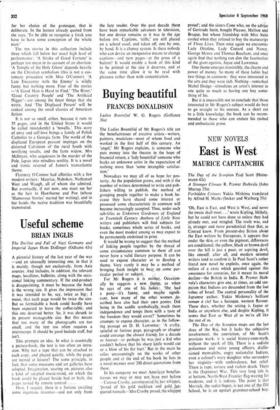Buying beautiful
FRANCES DONALDSON
The Ladies Bountiful of Mr Rogers's title are the benefactresses of creative artists—writers, painters, musicians—most of whom lived and worked in the first half of this century. An `angel,' Mr Rogers explains, is someone who puts money into the theatre in the hope of financial return, a 'lady bountiful' someone who backs an unknown artist in the expectation of nothing more than 'some intangible satisfac- tion.'
Nowadays we may all of us hope for pos- terity. As the population grows, and with it the number of writers determined to write and pub- lishers willing to publish, the method of grouping people together to make a book be- cause they have shared some interest or possessed some characteristic in common will become increasingly accepted. Thus, under such sub-titles as Unknown Gardeners of England or Twentieth Century Authors of Little Note writers and publishers will find subjects for books, sometimes whole series of books, and even the most modest among us may expect to be permanently enshrined in print.
It would be wrong to suggest that the method of linking people together by the thread of some circumstance common to them all can never have a valid literary purpose. It can be used to expose character or to develop a theme. Very rarely it may be a method of bringing fresh insight to beak op some par- ticular period or subject., • , For Mr Rogers it is neither; Occasion- ally he suggests a new Abe*, as when he says of one of his ladies : 'She had a pony—it's funny, and maybe signifi- cant, how many of the other women ,de- scribed here also had their own ponies. Did being in the saddle symbolicallyhteach them independence and tempt them, with a taste of the freedom they would covet?' Sometimes he attempts to expose character, as in the follow- ing passage on D. H. Lawrence; 'A crafty, spiteful or furious page, paragraph or chapter could estrange the closest friends, for a decade or forever—or perhaps he was just a kid who couldn't believe that his sharp knife would cut or a blow of his fist hurt.' But in the main he relies unassumingly on the works of other people and at the end of his book be lists in a novel manner over 200 direct,quotations from these.
In his company we meet American benefac- tresses we may or may not have met before —Caresse Crosby, accompan!ed by her whippet, 'proud of his gold necklace and gold.,,lac- quered toenails—Mrs Crosby proud, the whippet proud% and the sisters Cone who, on the advb of Gertrude Stein, bought Picasso, Matisse and Braque, but whose friendship with Miss Stein cooled when they refused to buy the manuscript of Three Lives. Then once again we encounter Lady Ottoline, Lady Cunard and Nancy, George Moore and Thomas Beecham, and once again find that nothing can dim the fascination of the giant egotists, Joyce and Lawrence. and power theme emerges irresistibly, the charm and power of money. So many of these ladies' had two things in common : they, were interested in the arts and they were rich. Nothing—remarked Mabel Dodge—stimulates an artist's interest in one quite so much as having one buy some- thing of his.
But it is impossible not to conclude that those interested in Mr Rogers's subject would do best to go straight to his sources. As a short cut to a little knowledge, the book can be recom- mended to those who can endure his rushed and enthusiastic prose.






































 Previous page
Previous page